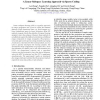53 search results - page 4 / 11 » A Non-convex Relaxation Approach to Sparse Dictionary Learni... |
108
Voted
AAAI
2011
13 years 11 months ago
2011
Variable selection problems are typically addressed under a penalized optimization framework. Nonconvex penalties such as the minimax concave plus (MCP) and smoothly clipped absol...
109
Voted
ICCV
2011
IEEE
13 years 11 months ago
2011
IEEE
Linear subspace learning (LSL) is a popular approach to image recognition and it aims to reveal the essential features of high dimensional data, e.g., facial images, in a lower di...
102
click to vote
CVPR
2008
IEEE
16 years 1 months ago
2008
IEEE
Sparse signal models have been the focus of much recent research, leading to (or improving upon) state-of-the-art results in signal, image, and video restoration. This article ext...
ICASSP
2010
IEEE
14 years 9 months ago
2010
IEEE
The enhancement of speech degraded by non-stationary interferers is a highly relevant and difficult task of many signal processing applications. We present a monaural speech enhan...
101
click to vote
ICML
2009
IEEE
15 years 12 months ago
2009
IEEE
Sparse coding--that is, modelling data vectors as sparse linear combinations of basis elements--is widely used in machine learning, neuroscience, signal processing, and statistics...

